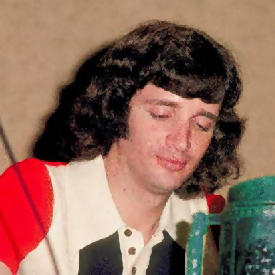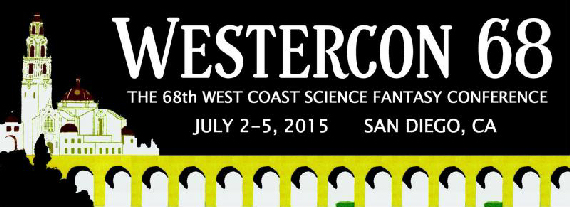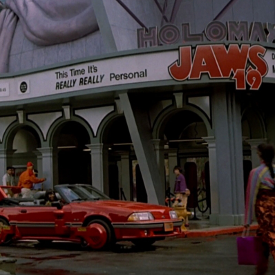
On or about July 2, 1975, four of us (me, Jon Gustafson, Dan Mullen and George—whose last name I’ve unfortunately forgotten), threw our luggage and a stack of New Venture #1s into the trunk of my green Opel and headed out from Pullman, WA to Oakland, CA for Westercon 28 (called OakLaCon), my (and our) first-ever convention, a distance of about 870 miles. My then-wife was not an SF fan—or much of a reader, in spite of being a librarian—and with her permission and a very strict budget I was “allowed” to go to a con. (Because I’m the “grasshopper” rather than the “ant,” I’ve been mostly penurious for much of my life; and since she worked for a university and I for a pinball- and jukebox-repair company, she controlled the purse strings.) Although I was the driving force behind New Venture, for the first issue it was very much a clubzine for the two- or three-year-old Palouse Empire Science Fiction Association, or PESFA. (So if you’re keeping track of the dates, last weekend marks the 40th anniversary of my first con!)
We were all very excited, having read about cons in various fanzines, and took turns driving. The Opel wasn’t very easy on gas—I kept track of the mileage vs. gallons used—even though, in that year, gas was running something like 60 cents/gallon. The drive must have (according to Google) taken about 14 hours, and I’m guessing we drove straight through. Annoyingly, the car kept overheating, and we kept having to pull over every couple of hours and wait for it to cool down—until, annoyed beyond all reckoning, I took out the thermostat (which was the culprit) and hurled the darned thing as far as I could throw it! (The car got hot, but never overheated after that. I don’t remember ever replacing the thermostat that summer; I think I did so when it got cold later that year.) We took turns driving; there was only one more car-related incident when, on the freeway outside Oakland, the fan belt broke! For some reason, I had a pair of (I believe) L’Eggs stockings in the trunk, and I fashioned a makeshift fan belt from those, which got us to the Leamington, which was that weekend’s hotel. Almost the first person I saw when entering the hotel, was Karen Anderson (wife of Poul Anderson) who, as I recall, was wearing a jacket with a whole bunch of personalized nametags and NASA patches. At that point, I resolved to get me some o’ those nametags myself! (I eventually ended up getting quite a few, including one by Leo and Diane Dillon!)
The GOH was David Gerrold (Figure 1); the FGOHs were Dena Brown and Charlie Brown with Special Guests Ian Ballantine and Betty Ballantine. Bjo Trimble was announced as toastmaster, but Bill Rotsler stood in for her at the con (according to Fancyclopedia). Attendance was about 1400. The memory bank doesn’t hold a lot of recollections from that weekend; I know that (as a neofan) I made a concerted effort to meet every pro I could, as previously the only SF author I had known was Frank Herbert (well, I did know Forry Ackerman, and even visited him at the Ackermansion in the late ‘60s). Jon and I met Poul and Karen Anderson, Bill Rotsler, David Gerrold—and got his okay to run his GOH/Keynote speech (“Stomp the Shadowman,” about the invisible entities that keep doing and saying things that people in the public eye are accused of; their “shadowmen,” or “shattengangers”) in New Venture; we met Michael Kurland, Michael Whelan (that’s where I bought the only Whelan original piece I own: a black-and-white illo from one of the Alan Burt Akers “Dray Prescott” books from DAW), Dale Enzenbacher, Emil Petaja (who sold me a Hannes Bok portfolio and the Virgil Finlay-illustrated “memorial issue” of A. Merrit’s Ship of Ishtar—both of which I still have), D.C. Fontana, among a host of others, and Avram Davidson, who was to become a good friend to both of us, and who sold us the right to serialize a “Doctor Eszterhazy” story in NV, possibly the only short story to be serialized.

Sadly, I am unable to put my hands right now on any photos from that weekend that I haven’t already published in Amazing Stories (see my 2013 columns), so I’ve had to steal the Gerrold pic in Figure 1 (that was a Worldcon 3 years prior to this Westercon, so he probably looked fairly similar); likewise, since the past weekend’s con is the 40th Westercon since my initial one, I stole this logo from the interwebs. I remember little about the con, besides my joy at being able to sit in the bar and buy drinks for many of my favourite authors, my attempt to attend each and every panel I could—that ambition went by the wayside many years ago; now I attend few panels I am not on—and the number of real, albeit long-distance friendships I formed. I was ultimately to attend a number of Westercons and even be Toastmaster at one in Vancouver (the second Vancouver Westercon; the first was Westercon XXX in 1980). Unfortunately, I was unable to attend my 40th-anniversary Westercon, as we are preparing to head to Missouri and must save money for that.
So Happy Faniversary to me!

BOOK REVIEW (mostly non-spoiler) of The Strange Birth, Short Life, and Sudden Death of Justice Girl, by Julian David Stone
Okay, this is almost a genre book—it’s fiction, and deals with a fictional super-hero, but by golly, it’s just a fun romp and I think maybe you should read it even though it’s not really genre. Okay? For many of you, it will feel like it was written about a foreign country, even though it takes place in and around New York City. The reason for that is that it’s set in the mid-1950s, a time many of you will regard with the same “that’s ancient history” dismissal that my generation gave to World War II. But bear with me; it’s a well-written novel, and even though some might not comprehend a time when all TV was black-and-white and performed on the spot (i.e., “live”); there were no satellites, no portable phones (often, whole blocks in New York had no phone and had to depend on the phone in the corner drugstore!), no LPs, no CDs, no DVDs—in fact, none of the creature comforts that are taken for granted these days. (On the other hand, movie theatres were usually air-conditioned—a necessity in summer—and for a dime or a quarter you could get a cartoon or two, a newsreel, coming attractions and two, count ‘em two feature films. Sure, they were mostly in black and white, but for movie buffs, especially kids, like I was back then, it was heaven. And popcorn, candy and a Coke would cost you an additional 35 cents or so.)
So. Back in the days of live TV, “Jonny Dirby,” (real name Jacob Drabinowitz) writer for the starring vehicle for aging Borscht-belt comic Herman Fox, “Hermie’s Henhouse,” has been asked—as most people in the entertainment field at that time, whether in Noo Yawk or Hollywood (thanks to that fun-loving man-about-town Senator Joseph McCarthy and his witch hunt for Communists—sorry, I mean the House UnAmerican Activities Committee or HUAC) have been asked—to sign a loyalty oath, which goes like this: I, the undersigned, swear and affirm that I do not advise, advocate, or teach the overthrow, by force, violence, or other unlawful means, of the government of the United States of America, and that I am not now, nor have I ever been a member of or affiliated with any group, society, association, organization, or party that advises, advocates, or teaches, or has advocated or taught the overthrow, by force, violence, or other unlawful means, of the government of the United States of America.
Now, Jonny is as patriotic as the next guy—his brother was a “war hero,” and his sister was killed making tires for the war effort—but he feels that being asked to certify this is an insult. Several of his friends have been blacklisted—which means that nobody dared to hire them—for either being Communists or for having done something that brands them a “comsymp” or Communist Sympathizer; and it could be something innocent—to most people—like attending a rally. Once you’re blacklisted, you are totally screwed as far as working in the entertainment industry is concerned. So not signing the oath is Jonny’s personal finger to McCarthy and his ilk; however, he comes to realize that if he doesn’t he will be blacklisted, so he reluctantly signs, only to find out that he’s too late. He is fired from “Hermie’s Henhouse,” and will probably find himself blacklisted. As a gesture of protest, he rewrites a small skit—hey, this is live TV, and the actors are used to having to memorize last-minute changes—and has the character of “Justice Girl” deliver a short but impassioned speech about justice before he leaves the building.

Surprise! The skit is a big, big hit and Jonny wakes from a hangover in the morning to find that Hogart Daniels, the president of the Regal Network (for whom Jonny used to work before yesterday) has been trying to reach him. But that’s not all—unbeknownst (isn’t that a great word?) to Jonny, the actress playing Justice Girl, Denise Yarnell, is actually Felicity Kensington, a “high-society dame” type from Greenwich, Connecticut, who is trying to get the dirt on Communist fronts for her dad, a would-be candidate for a newly-vacant Senate seat. For those of you who didn’t live through that era—or who slept through that particular American History class—a “front” (not to be confused with Communist Fronts, which are organizations under the control of the Communist Party pretending not to be Communist organizations) is a writer who, while not blacklisted himself (or herself) turns in work by blacklisted writers under his or her own name and, in turn, turns over the payment for the work to the same writers.
Felicity believes that the New York TV industry is riddled with Communist front writers—and suspects Jonny is one of them; although not really an actress, her looks and physical attributes have been sufficient for her to qualify as Justice Girl for the one skit… and when Justice Girl proves to be a bigger hit than the show that spawned it, she is poised to find out all she can about subversion and collaboration in the entertainment world. And a hit it is—Jonny is wooed back by promises of big payday and autonomy in writing and directing “his” show; since he wrote it after Hogart had fired him, he owns the character, and Regal desperately wants to have a big hit, and doesn’t want Jonny taking his show to another network. Hogart dreams of competing with the Big Three—ABC, NBC and CBS—on level ground. Aided by his lawyer, war-hero big brother Mitchell, Jonny holds up Hogart and Regal and even has a clause allowing him to (quietly) use other writers who may not have, shall we say, “good” credentials (i.e., blacklisted).

Of course, Jonny really is a front for three of his blacklisted friends; he has no idea that Denise/Felicity is looking for commie collaborators. And Felicity has not told her upper-crust family that she, wearing a blonde wig, is playing a part in a (shudder) TV show; becawse our kind don’t do that sort of thing, or associate with those kinds of people, don’t you know. Other forces are also in play: although Hogart wants to take Regal big time, the Board of Directors and the Chair, are trying to sell Regal off. There are several threads running in parallel (or weaving through the narrative), including a certain number of flashbacks; it’s all a big romp through the early days of TV, which probably many fans won’t be familiar with. (I mean, c’mon, it’s black and white!) You may also learn something about discrimination, but this is definitely not a didactic book; it’s sheer entertainment.
This Kindle release, which may be down to 99 cents until July 15, actually is copyrighted 2013, but Justice Girl (see Figures 4 and 5), in the person of Sara Di Valenzano, will be making a personal appearance at the current San Diego ComiCon. So whether you are going to ComiCon or not, I suggest you read this book; I think you will enjoy it. (I say “may” because although the author says it’s 99c until July 15, I can only find the prices $2.63 US and $3.33 CDN. Your mileage may vary.)
I’d appreciate a comment on this week’s column. You can comment here, or comment on my Facebook page, or in the several Facebook groups where I publish a link to this column. Your comments are all welcome, whether you agree with my opinions or not. My opinion is, as always, my own, and doesn’t necessarily reflect the views of Amazing Stories or its owners, editors, publishers or other bloggers. See you next week!










